European Union Collective – Christopher Story – Introduction 1.3
STALINIST MODEL REPLACED BY THE LENINIST MODEL
Christopher Story "died under mysterious circumstances" after writing this book. He was an adviser on intelligence matters to Prime Minister Thatcher and published Soviet Analyst for many years. In the opinion of many he was better informed than British and US intelligence organisations put together. This book is a daring analysis of the plans of two major players in the battle for Europe's destiny. One is Germany and the dream of a Pan-Germany. The other is Russia, which had plans since the Soviet era.
In our days, the EU is seen as an enemy of the nations it comprises, thus Christopher Story thinks. He is able to see a "German and Russian strategy to complete Lenin's World Revolution
https://www.amazon.com/European-Union-Collective-Member-States/dp/1899798013
https://www.goodreads.com/en/book/show/9976147-european-union-collective
Notes and references:
20. Joseph Stalin (Djugashvili), 'Marxism and the National Question', 1942.
21. Kassof, Allen, 1965, 'The Soviet Youth Program', Cambridge: Harvard University Press, page 45; cited in 'Contemporary Soviet Politics: An Introduction', Donald D. Barry and Carol BarnerBarry, Prentice Hall, Englewood Cliffs, NJ, 1978-91.
22. 'Soviet Analyst', Volume 26, Number 3, March 2000.
23. Theses on the National and Colonial Question'adopted by the Second Comintern
Congress, 28th July 1920 [Protokoll, ii, page 224], cited for instance in 'The Communist
International 1919-1943: Documents': Volume 1,1919-1922, selected and edited by Jane Degras,
Oxford University Press, 1956. The set of three volumes of this work in this Author's possession
was obtained from a second-hand bookstore in Bloomsbury, London; each volume is stamped
as follows on the front fly-sheet: 'MINISTRY OF DEFENCE LIBRARY SERVICES: WITHDRAWN'.
24. The introduction to 'Prodi's Neo-Communist Manifesto' includes the following paragraph:
'Political integration will become a reality as political leaders and citizens come to realise that
their shared values of liberty, peace and stability, democracy, human rights, tolerance, gender
equality, solidarity and non-discrimination [i.e., the attitude 'distinguished by conscious collectivism and deep concern for the common good' specified in the Soviet tome 'Fundamentals of Marxism-Leninism'] can best be promoted through shared policies and institutions'. However
when the Austrian electorate voted a non-leftist Government led by Georg Haidar into power,
the European Union immediately isolated Austria and imposed sanctions upon it for having
had the temerity to elect a Government not overtly enamoured of the EU's collectivist-federalist agenda. The exclusion of Austria was masked by a fog of allegations that Haidar represented an
insupportable neo-Nazi tendency which could not possibly be tolerated in the 'liberal' European
Union. So much for the value of 'tolerance' invoked by 'Prodi's Neo-Communist Manifesto'
distributed within the EU structures in February 2000.
-
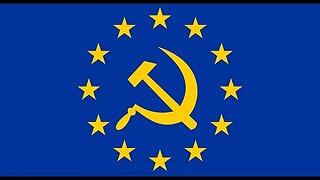 13:21
13:21
Eugen Richter Audiobooks
2 years agoEuropean Union Collective – Christopher Story – Introduction 1.2
90 -
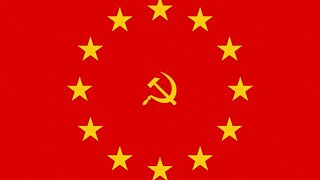 14:36
14:36
Eugen Richter Audiobooks
2 years agoEuropean Union Collective – Christopher Story – Introduction 1.1
108 -
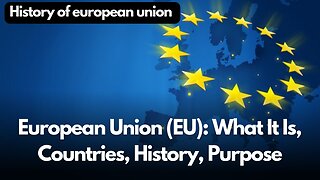 12:41
12:41
The History Speaks (Books Reader)
1 year agoHistory of european union | European Union (EU): What It Is, Countries, History, Purpose
2831 -
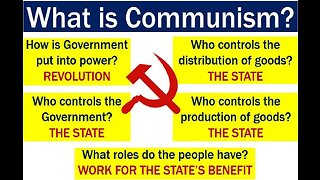 5:21
5:21
What If Everything You Were Taught Was A Lie?
1 year agoManifesto of the New World Order and Christianity and Communism Summary W0W
6892 -
 3:13
3:13
Belgian Congo
1 year agoWas European Colonialism Racist?
102 -
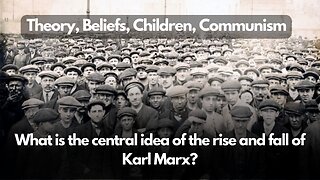 10:12
10:12
The History Speaks (Books Reader)
1 year agoWhat is the central idea of the rise and fall of Karl Marx? | Theory, Beliefs, Children, Communism
9541 -
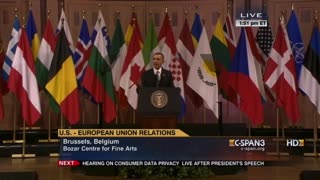 36:41
36:41
1Candyman1
3 months agoMARCH 26, 2014 U.S.-European Union Relations w/Barrack Hussein Obama
34 -
 1:39:39
1:39:39
RAVries
1 year agoREVEALING - Dutch Farmers: Canaries in the Globalist Coal Mine | Michael Yon & Eva Vlaardingerbroek | EP 340 Jordan B Peterson
2.19K1 -
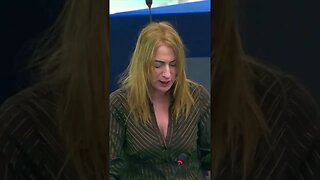 1:00
1:00
NeutralityStudies
1 year agoNO Imperial Europe: Clare Daly's Call for Maintaining Veto Power in the EU Parliament
94 -
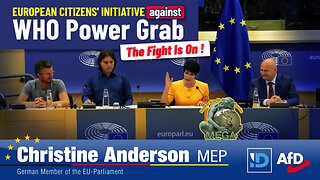 6:55
6:55
RAVries
1 year agoThe Fight Is On! - EUROPEAN CITIZENS' INITIATIVE against WHO Power Grab Christine Anderson, MdEP
1.36K4